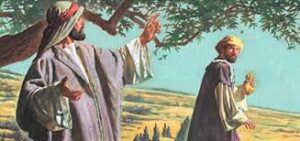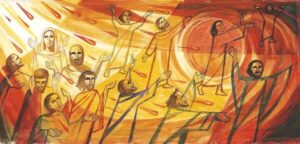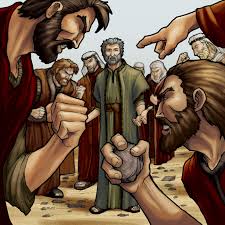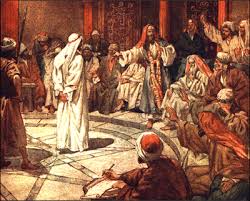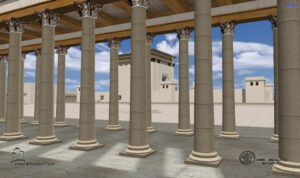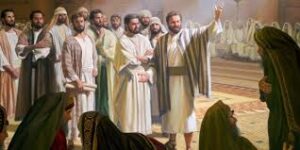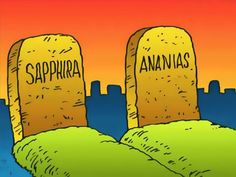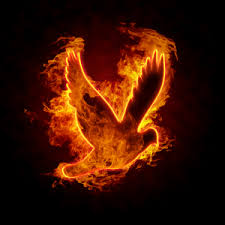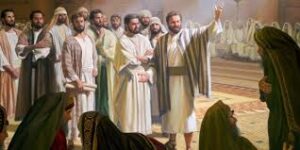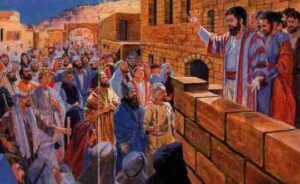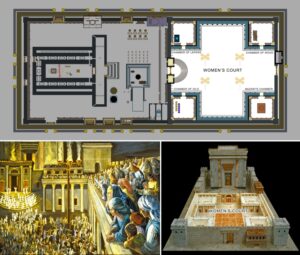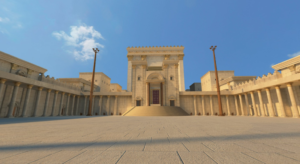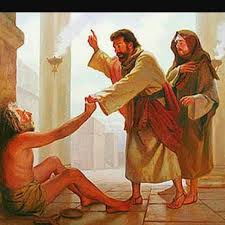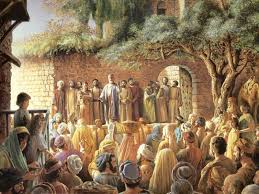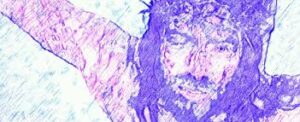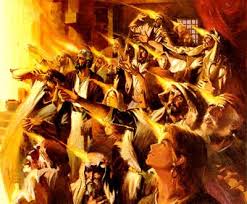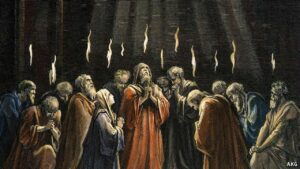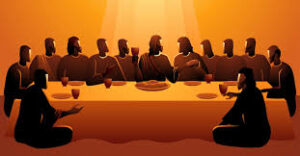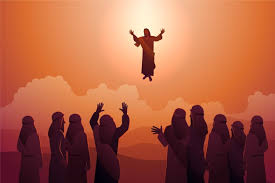Bb – An Ethiopian Asks about Isaiah 53 8: 26-40
An Ethiopian Asks about Isaiah 53
8: 26-40
34 AD
An Ethiopian asks about Isaiah 53 DIG: Why does the eunuch visit Jerusalem? The eunuch was reading Isaiah 53. In what does Yeshua fit the picture of the One described there? If you were Philip using Isaiah 53, what would you emphasize about the gospel? How did God pave the way for his message? What is the relationship between divine preparation and human initiative in this account? What is the significance of this story for the Messianic Community being persecuted in Yerushalayim? So far, what has been the effect of Stephen’s death upon Philip? Upon the Messianic Community as a whole? What is the Isaiah Avenue?
REFLECT: For the way God sets up opportunities to witness (2:5-14, 3:6-16, 8:26-40), how does that free you from fears in evangelism? What do these stories show about the context in which evangelism is to happen? Deep down, do you think successful CEO’s really need the gospel as much as poor beggars (3:2)? Why or why not? Would you know the Bible well enough to speak to the eunuch’s questions? How can you grow in your faith so you will be prepared for surprise opportunities?
Philip figures in a second story, which is again concerned with the missionary expansion of the Church. The story is included here both because it is about Philip and because it forms part of the gradual, but inexorable progress in Acts from the Jewish beginnings of the Messianic community in Jerusalem to the Gentile growth of the Church to the end of the earth (1:8). Not only that, but this story also includes those who were excluded from the full rights of Judaism. The way in which the story is told bears some resemblance to another account in which a Stranger joined two travelers and opened up the Scriptures to them, took part in a sacramental act, and then suddenly disappeared from view (see the commentary on The Life of Christ, to see link click Mh – On the Road to Emmaus).177
After Peter and John had returned to Jerusalem (8:25), Philip received a new commission. The story is set in motion by an angelic command to Philip which took him away from the scene of successful evangelism (see Ba – Simon the Sorcerer), and led him to a place that didn’t seem that promising. Now an angel of the Lord spoke to Philip, saying: Get up, and go south at noon (Greek: mesembrian because the sun lies directly south at noon) on the road going down from Jerusalem to Gaza. There were two roads from Jerusalem to Gaza, and the Spirit commanded Philip to take the one that was seldom used. So he got up and went. He did not struggle with the somewhat crazy notion to go down a hot, desert road at noon. Immediately obeying, however, he saw an Ethiopian eunuch – an official who was responsible for all the treasure of Candace, queen of the Ethiopians (8:26-27a). Ethiopia, south of Egypt, is the biblical Cush (Second Samuel 18:21-32; Jeremiah 46:9), its populace being identified with the sons of Ham, through his first son Cush. According to the Bible, King Solomon developed a widespread commercial network through Egypt and Cilicia to Sheva (southern Arabia) by way of the newly-constructed port of Ezion -Geber on the Red Sea (First Kings 9:26-28, 10:1-13). Josephus identified the Queen of Sheva as the Queen of Ethiopia (see the commentary on the Life of Solomon Bu – Solomon and the Queen of Sheva).178 This remote, but advanced culture was the object of endless curiosity for the Greeks and Romans who considered it the end of the earth. In other words, the eunuch had traveled no small distance and was an official of no small kingdom.179
The Ethiopian eunuch was a court official responsible for all the treasure of Candace: The word court official in Greek is dunastes and this is where we get the word dynasty. In Luke 1:52 it is used of rulers. In First Timothy 6:15 the same word is used of God. The fact that this word is used of him means that he had a very high and influential position in the government. In modern terms, he was the Minister of Finance in Ethiopia, one of the highest positions in their government. So his influence in Ethiopia would have been great.
Candace, queen of the Ethiopians: This was not a proper name, but like Cesar, Pharaoh and Abimelech, an official title. Because the Ethiopian Kingdom was a matriarchy, the king of Ethiopia was considered a child of the sun and therefore too sacred to perform any of the human functions of royalty. Therefore, the queen mother performed all of the royal duties and she always had the title of Candace, and the real power behind the throne.
He had traveled to Jerusalem to worship (Greek: proskuneo, meaning to kiss the face, or to worship) and was now returning (8:27b). He was concerned enough about his spiritual life that he traveled at least sixty days to Jerusalem to worship the God of Abraham, Isaac, and Jacob, but his heart was still not satisfied. This Ethiopian represents many people today who are religious, read the Scriptures, and seek the truth, yet do not have saving faith in Yeshua Messiah. They are sincere, but they are sincerely lost. They need someone to show them the way.180
He was sitting in his ox-drawn wagon, he was reading the prophet Isaiah out loud (8:28). This was and is a common practice in the Near East, even when they do it for their own instruction, without any intention of being overheard by others. They swing the head, and even the entire upper body, from side to side as they read, and utter words with a tone that comes nearer to singing than to our unimpassioned mode of reading.181 Apart from the Ruach’s orchestration of events, this meeting would have never taken place at all. Once again this emphasizes the sovereign work of the Ruach ha-Kodesh in salvation.
He was a eunuch: How he came into contact with Judaism is not told. The term eunuch normally indicates a person who has been castrated; such people were forbidden entry to the Temple according to the Torah of Moses (Deuteronomy 23:1). That meant that he could never be a full proselyte. There were three levels of Gentile relationship to Judaism.
The first level were God-fearers: These were Gentiles who became convinced that ADONAI was the only true God, they abandoned their paganism and idolatry, but they did not choose to become a proselyte in any form, and hence there was no adoption of Jewish customs or practices (see Be – The Centurion’s Vision). The second level were Proselytes at the Gate: The Gate was the middle wall of separation (Ephesians 2:14) in the Temple compound that Gentiles were not allowed to go beyond under penalty of death (see below). They were to follow the “seven laws of the sons of Noah.” These were (1) do establish laws, (2) do not curse God, (3) do not practice idolatry, (4) do not engage in illicit sexuality, (5) do not participate in bloodshed, (6) do not rob, and (7) do not eat the flesh of a living animal (Sanhedrin 56a; Toseta Zarah 8:4; and Genesis Rabbah 34:8).
This was a Gentile who adopted many Jewish practices like celebrating Shabbat and the feasts of Isra’el, but did not become a full proselyte. Most of these were men because this level didn’t require circumcision. And the third level were Proselytes of the Covenant: They entered the Covenant of Sinai as a full Jew, so to speak. Most of these were women because this level required circumcision.182
So because the Ethiopian eunuch had been castrated, he did the best he could and became a Proselyte of the Gate. And that meant that he had adopted many of the practices of Judaism, in fact, he did everything a proselyte would have done except for circumcision. Despite his power and prestige, however, the Ethiopian had a vast emptiness in his soul. He had traveled to Yerushalayim to worship on the occasion of one of the three travel festivals of either Sukkot (Booths), Pesach (Passover), or Shavu’ot (Weeks), and was on his journey home, passing the time by reading from his Greek translation of the TaNaKh.183 This was not a state visit, he came to worship ADONAI. He was hungry for God’s Word. It was this man that Philip was to meet on a lonely desert road. The eunuch is a classic example of the one who lived up to the light he had. Then God gave him the full revelation of Yeshua Messiah through Philip’s ministry.
In all the TaNaKh, Isaiah holds the greatest hope for the eunuch in his picture of God’s ideal future, a future that promises a monument in God’s house, a name better than sons and daughters, an everlasting name that will not be cut off (Isaiah 56:3-8). Little did the eunuch know that he was about to experience the fulfillment of those promises. And little did Philip know his own role in their fulfillment. Philip was probably still wondering why God had sent him to this lonely place, and perhaps he was a bit bemused by the strange spectacle of the ox-drawn wagon in front of him (plodding along at not much more than a walking pace), with its exotic passenger and his entourage following behind. Then suddenly, for the second time in the story, Philip received a divine command. Now, the Ruach ha-Kodesh said to Philip, “Go, and catch up with this wagon” (8:29).184 The rabbis taught that when God speaks in heaven, “the daughter of His voice” the bat-kol, or an echo, is heard on earth. After the last of the prophets, it was considered that God provided the bat-kol to continue to give guidance to the people (Tractate Yoma 9b).
Although the eunuch’s entourage must have been impressive, Philip was not intimidated. Instantly complying with the voice of the bat-kol, Philip ran up to the slow-moving wagon and began to trot alongside. There, he heard the Ethiopian reading the prophet Isaiah. Because he was a man of position, he would have had a driver handling the ox-drawn wagon. Therefore, he would have had the time to read. Not only that, but by the providence of God, this man was reading from one of the key Messianic prophecies pointing to Yeshua (Isaiah 52:11 to 53:12). At that moment, Philip probably knew that ADONAI had given him an open door, a prepared heart.
When Philip heard the eunuch reading out loud it provided an opening and he said: Do you understand what you are reading (8:30)? Philip wasn’t asking if the eunuch understood the words he was reading. What he really wanted to know was, “Do you know who the passage is speaking about?” It was good for the Ethiopian to be reading Isaiah, but unless understanding was brought to him, there would be no benefit from his reading. The book of Acts has already referred to Yeshua four times as the Servant of God (3:13 and 26, 4:27 and 30). Modern Jewish interpretation understands this servant to be the people of Isra’el (see the commentary on Isaiah Iy – The Death of the Suffering Servant), not the Messiah.
Philip’s experience ought to encourage us in our own personal witness for the Lord. To begin with, ADONAI directed Philip to the right person at the right time. You and I are not likely to have an angel instruct us, but we can know the guidance of the Holy Spirit in our witnessing if we are walking in the Spirit and praying for God’s direction.185
God had already prepared the man’s heart to receive Philip’s message. Then the Ethiopian responded, “How can I,” he said, “unless someone guides me?” He realized that he needed someone to interpret the passage. The evangelist’s heart must have been rejoicing in the confidence that YHVH had so prepared this eunuch. He had a seeking, humble and teachable spirit. But the passage was Isaiah 53:7b-8, and it puzzled the eunuch. So, he invited Philip to come up and sit with him (8:31).
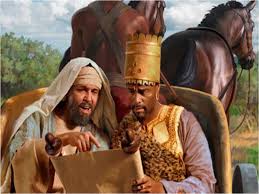
As the Minister of Finance in Ethiopia, he was more than likely able to speak Greek, the international language of the day. Now the passage of Scripture that he was reading from the Septuagint (LXX) was this:
“He was led as a sheep to slaughter;
and as a lamb before its shearers is silent,
so He opens not His Mouth.
In His humiliation justice was denied Him.
Who shall recount His generation?
That is, since Yeshua died a physical death, He will have no physical descendants. This is a lament. But the lament proves to be unwarranted in Yeshua’s case, because He is raised from the dead, and in Him are many spiritual children, as Isaiah would say a few verses later: He will see His offspring, He will prolong His days, and the will of Adonai will succeed by His hand (Isaiah 53:10b LXX). God does the unexpected, providing descendants for the One who died with neither wife nor children. For His life was taken away from the earth” (8:32-33).
The eunuch replied to Philip, “Please tell me, who is the prophet talking about – himself or someone else.” His confusion is understandable, since contemporary Jewish thought was divided on the interpretation. Isaiah did not meet the requirements of the passage, even though he was a servant of God. Then Philip, who was not slow to give an answer, opened his mouth. The phrase “to open one’s mouth,” is used when something of great significance is to follow. Here, then, is the climax of the conversation. Philip developed some common ground with the Ethiopian by talking about Isaiah, but made his way to proclaiming the Good News about Yeshua (8:34-35). Clearly, his first step was to show that Messiah was the One who fulfilled Isaiah’s prophecy. A description of the general character of Yeshua, and the way He suffered unjustly and was condemned to death, would prove the point.
The fact that Isaiah 53:7-8 was not the whole story, but just the starting place. Now as they were going down the road, they came to some water. The eunuch said: Look, water! What’s to prevent me from being immersed (8:36)? Obviously, Philip must have spoken to him of Peter’s speech regarding the appropriate response to the Good News, “Repent. Let each of you be immersed in the name of Messiah Yeshua because of the removal of your sins, and you will receive the gift of the Ruach ha-Kodesh (2:38). In the same way, it can be assumed that the eunuch must have given Philip his profession of faith in Yeshua Messiah.186 So the eunuch ordered the wagon to stop so he could make a public confession. Philip agreed and they both got down into the water and Philip immersed him (8:38). Immersion is the public confession of an inward conviction. So the eunuch not only confessed his faith personally to Philip but openly in front of his entire caravan.
But the lack of any clear mention of the eunuch’s profession of faith led some early scribe to “improve” on the story by adding this verse. “Philip said, ‘If you believe with all your heart, you man,’ the eunuch answered, ‘I believe that Jesus Christ is the Son of God’ (8:37).” The oldest and most reliable manuscripts, however, do not include this verse so neither do I.
When they came up out of the midst of the water, the Ruach Adonai snatched (Greek: harpazo, meaning caught up, to be taken away suddenly and miraculously) Philip away. This is the same word that Paul used when describing the rapture of the Church: After that, we who are still alive and are left will be snatched up (Greek: the root word is harpazo, meaning caught up) together with them in the clouds to meet the Lord in the air (First Thessalonians 4:17), and the eunuch saw him no more. By performing this startling miracle the Ruach ha-Kodesh confirmed to the entire caravan that Philip was indeed His spokesman. As for the eunuch, he went on his way, rejoicing in the joy of the Lord (8:39). The joy of the Ethiopian, even after Philip’s abrupt departure, showed that his faith was firmly rooted in God, not in Philip. Luke does not give us the subsequent history of the Ethiopian eunuch, but according to Church Father Irenaeus, he became a missionary to the Ethiopians and perhaps established the first church on the continent of Africa.187
But Philip found himself at Azotus (the new Greek name for Ashdod), some twenty miles north of Gaza. Philip continued doing the work of an evangelist as he passed through, he kept proclaiming the Good News to all the towns until he came to Caesarea (8:40). There, he married and settled down (21:8-9). As a result, Caesarea became the new center of Hellenistic Judean believers. It may have been due to Philip’s preaching in this area that churches were established in Lydda and Joppa (see Bd – Signs and Miracles Follow Peter). Caesarea continued to be a haven for Hellenistic Jewish believers until 66 AD when, as a result of the Jewish revolt, the leaders of the Messianic congregation in Caesarea immigrated out of the country to the province of Asia, or present-day Turkey.188
In October 1857, J. Hudson Taylor began to minister in Ningpo, China, and he led a Mr. Nyi to Christ. The man was overjoyed and wanted to share his faith with others. “How long have you had the Good News in England?” Mr. Nyi asked Hudson Taylor one day. Taylor acknowledged that England had known the gospel for centuries. “My father died seeking the truth,” said Mr. Nyi. “Why didn’t you come sooner?” Taylor had no answer for this penetrating question. How long have you known the gospel? How far have you shared it personally?189
The God of Isra’el desires to provide people with His rest and peace through an eternal relationship with Himself. The following five principles, taken from the prophet Isaiah, help us to recognize how we can have that relationship. Just as believers have often used a series of verses from Romans called “the Romans Road,” messianic believers, witnessing to Jews, can use a different series of verses from Isaiah called “the Isaiah Avenue.”
Sinners Before God
For all of us have become like one who is unclean, and all our righteousness is like a filthy garment, and all of us wither like a leaf, and our iniquities carry us away, like the wind (Isaiah 64:5). We may judge ourselves by relative standards, thinking, “I’m as good as the next person,” or, “I’m no worse than the next guy.” Yet, God judges each of us by His absolute standards of Himself and His Torah: You shall be holy, for I, ADONAI your God, am holy (Leviticus 19:2). By His standards, we are all moral failures.
Granted, you may be a nice person, and you may remember to call your mom on Mother’s Day; it’s just that you and “the next person” still fall short of God’s high holy standards. By the way, every Messianic rabbi or pastor has the same problem. Psalm 14:3 declares: There is none that does good, no not one. We are all born with the fatal disease of sin passed down through Adam. So, no one can point fingers or throw stones at anyone else; we all have the same great problem of original sin.
Separation From God
Surely the arm of ADONAI is not too short to save, nor His ear to dull to hear. Rather, your iniquities have made a separation between you and your God. Your sins have hidden His face from you, so that He does not hear (Isaiah 59:1-2). The result of our sin nature is a broken relationship with God. Now you may pray and even fast, but the Bible is clear: He will not hear. It’s as if I stole money from you, and then had the nerve to come to you and ask for a gift! Your response should be, “first let’s deal with the past offense, then I can consider your present or future needs.” God wants to bless you, but your sin nature separates you from Him, and must be dealt with first before He can bless you.
Since this separation continues to our death, it becomes a judgment of everlasting separation from God. This breaks God’s heart. He truly loves you and desires you to have everlasting life with Him. That’s why the story doesn’t end here, but continues on with the Good News for your life.
Salvation In God
We all like sheep have gone astray. Each of us turned to our own way. So ADONAI has laid on Him [Messiah] the iniquity of us all (Isaiah 53:6). God has provided the way of salvation and forgiveness, since we can do nothing, no good deed, to save ourselves. The best fifteen minutes of our lives cannot save us; the greatest accomplishment of our lives cannot save us either. Because of His great love, God has promised to send Messiah to die as the atonement or payment for our sins. In the New Covenant, Messiah Yeshua states as well: I give My life as a ransom for many (Matthew 20:28). This is the salvation and right relationship that God offers freely.
The Savior Is God
For to us a child is born, a son will be given to us, and the government will be upon His shoulder. His Name will be called Wonderful Counselor, Mighty God, Everlasting Father, Prince of Peace. Of the increase of His government and shalom there will be no end – on the throne of David and over His Kingdom – to establish it and uphold it through justice and righteousness from now until forevermore. The zeal of ADONAI-Tzva’ot will accomplish this (Isaiah 9:5-6). Only God Himself could provide the perfect sacrifice for sins, as He alone is perfect. What amazing love and humility that the Mighty God of Isra’el would be born, live as a man, and die as the perfect payment for our sins. Messiah Yeshua is Adonai, the Lord.
Eternal Security With God
You keep in perfect peace one whose mind is steadfast on You, because he trusts in You (Isaiah 26:3). Perfect peace (shalom shalom) is found only in God and is accessible only through faith/trust/belief in Messiah. Simple acknowledgement of our sins and faith in Messiah Yeshua as our substitute, our sacrifice, our saving atonement, is the necessary action to a right relationship with God. The Bible says: Abraham believed God, and He credited it to him as righteousness (Genesis 15:6). Like Abraham, you can have a right relationship with God by faith in what He alone has provided. Here’s a simple prayer that help you:
Lord, please forgive me for all my sins through Messiah’s sacrifice on the cross for me.
Help me to follow Yeshua and honor You.
Thank You for loving me. Amen.190
If you have prayed this prayer, see my commentary on The Life of Christ Bw – What God Does for Us at the Moment of Faith.



